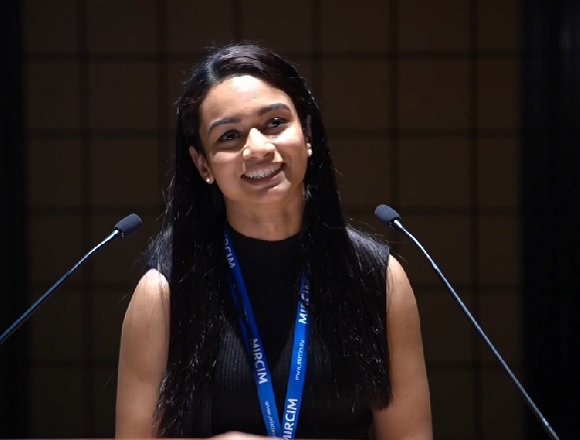Inspired by these case presentations? Now it’s your turn to take the stage! Young Talents in Internal Medicine World Contest invites young health professionals to showcase their diagnostic skills and discuss compelling reports from their own practice. Read more at youngtalents.one.
Case description
A 34-year-old healthy woman presented to the emergency department with abdominal pain in December 2022. A computed tomography scan revealed a bulky right adrenal tumor with retroperitoneal hemorrhage, tumor thrombus in the inferior vena cava, left-sided pulmonary embolization, and multiple pulmonary metastases. Ongoing bleeding necessitated selective embolization of the right adrenal artery.
Hypertension was present from the beginning (treatment with the following combination of antihypertensive drugs was started: perindopril, spironolactone, amiloride, amlodipine, doxazosin, and metoprolol), along with severe hypokalemia (2.4 mmol/L) despite extensive substitution. A core cut biopsy of the subpleural lesion was interpreted as a metastasis of pheochromocytoma. However, plasma and urine metanephrines were repeatedly negative, chromogranin A was only slightly elevated, and central hypocortisolism (adrenocorticotropic hormone, 1.33 pmol/L; cortisol, 92.8 pmol/L), hypoaldosteronism (aldosterone, 0.078 nmol/L) with unelevated renin (4.2 ng/L) and extremely elevated 11-deoxycorticosterone (DOC; 60.7 nmol/L) predominated. Scintigraphy (meta-iodobenzylguanidine, tectrotyd) showed a physiological distribution of the radiopharmaceuticals. The histopathological findings of the subsequently extirpated lung metastasis were identical with those obtained in the core cut biopsy (cytokeratin-negative, strongly positive for synaptophysin, and positive for chromogranin A). The germinal variant and the next generation sequencing variant were negative.
Initial treatment with sunitinib had no effect. Following a second opinion of an international team of experts, the histopathological findings were reclassified as adrenocortical carcinoma (ACC; high incidence of necrosis, SF-1 positivity, and GATA3 negativity). Subsequently, treatment with combination chemotherapy (cisplatin, doxorubicin, etoposide) and mitotane was started, with a partial response (regression of lung metastases).
About Best Case Report Contest 2024
Young Talents in Internal Medicine World Contest—previously Best Case Report Contest—is a contest for internal medicine specialists or trainees in internal medicine up to 35 years of age. Every year the most engaging submissions from around the world are presented by authors during a special session at the McMaster International Review Conference of Internal Medicine (MIRCIM). Visit youngtalents.one to learn more.
To browse all abstracts from Best Case Report Contest 2024, visit Polish Archives of Internal Medicine.
 English
English
 Español
Español
 українська
українська

_580x440.png)
_580x440.jpg)

